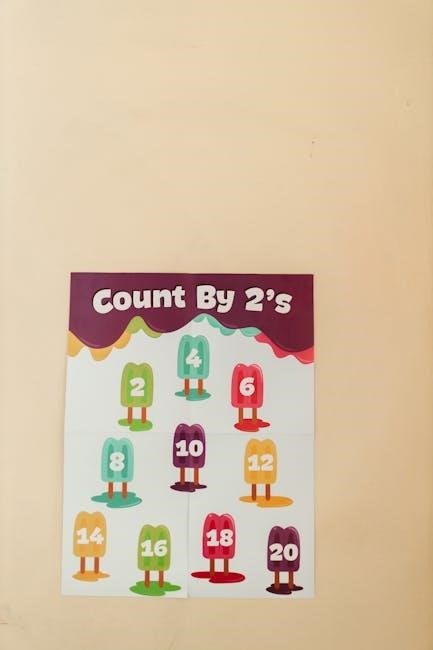The 12 Hours Sleep by 12 Weeks Method‚ outlined in Suzy Giordano and Lisa Abidin’s book‚ offers a structured approach to help babies sleep 12 hours nightly by 12 weeks old. This method‚ known for its simplicity and limited-crying technique‚ promises a gentle yet effective solution for sleep-deprived parents.
Overview of the Book and Its Core Promise
Suzy Giordano and Lisa Abidin’s Twelve Hours Sleep by Twelve Weeks Old offers a clear‚ step-by-step plan to help babies sleep 12 hours nightly by 12 weeks old. The book promises a limited-crying approach‚ focusing on structured feeding schedules and bedtime routines. It assures parents that their baby can achieve consistent‚ uninterrupted sleep‚ addressing a common challenge for many families. The method is designed to be simple and effective‚ with a focus on establishing healthy sleep habits early on.
The Importance of Sleep Training for Babies
Sleep training is crucial for babies as it establishes healthy sleep habits‚ promoting physical and cognitive development. The 12 Hours Sleep by 12 Weeks Method emphasizes the importance of consistent routines‚ ensuring babies learn to self-soothe and sleep independently. This approach not only benefits the baby but also improves the entire family’s quality of life‚ reducing stress and fostering a well-rested household. Early sleep training sets the foundation for long-term sleep success and overall well-being;

The 12 Hours Sleep by 12 Weeks Method
Twelve Hours Sleep by Twelve Weeks Old‚ by Suzy Giordano and Lisa Abidin‚ offers a four-step sleep training plan to help babies sleep 12 hours by 12 weeks old.
Understanding the Four-Step Sleep Training Plan
The plan begins with establishing a consistent feeding routine‚ ensuring babies eat every four hours during the day. Step two involves creating a calming bedtime routine to signal sleep. Step three gradually reduces nighttime interventions‚ allowing babies to self-soothe. Finally‚ step four emphasizes maintaining consistency and patience‚ as deviations can disrupt progress. This structured approach helps babies learn to sleep independently‚ achieving 12 hours of uninterrupted sleep by 12 weeks old.

Prerequisites for Starting the Sleep Training
Before beginning the 12 Hours Sleep by 12 Weeks method‚ babies must meet specific criteria. They should weigh at least 9 pounds and consistently consume 24 ounces of milk daily. This ensures they are physically ready for sleep training. Additionally‚ parents must commit to a structured routine and be prepared for consistent implementation. Meeting these prerequisites is crucial for the method’s success and the baby’s ability to sleep through the night by 12 weeks old.
The Role of Feeding Schedules in Sleep Success
A consistent feeding schedule is vital for the 12 Hours Sleep by 12 Weeks method. Babies are encouraged to have four feedings during the day‚ spaced four hours apart‚ ensuring they consume enough nutrients. This structured approach helps regulate their internal clock and increases the likelihood of sleeping through the night. A well-fed baby is better prepared to meet the 12-hour sleep goal by 12 weeks‚ making feeding schedules a cornerstone of this method’s success.

Key Components of the Sleep Training Program
The 12 Hours Sleep program focuses on structured steps‚ feeding schedules‚ calming bedtime routines‚ and gradual changes to help babies achieve 12-hour nights by 12 weeks.
Step 1: Establishing a Consistent Feeding Routine
Step 1 emphasizes creating a predictable feeding schedule‚ with four daytime feedings spaced four hours apart. This helps regulate the baby’s metabolism and sets the foundation for longer nighttime sleep. Consistency ensures the baby eats sufficiently during the day‚ reducing nighttime wakings. Parents must stick to this schedule‚ even if the baby seems full or fussy‚ to build a reliable routine that supports sleep training goals.
Step 2: Creating a Calming Bedtime Routine
Step 2 focuses on developing a soothing pre-sleep routine to signal to your baby that it’s time to rest. This includes activities like bath time‚ reading‚ or playing soft music. Consistency is key; performing these calming rituals daily helps your baby transition smoothly to sleep. A predictable routine reduces overstimulation and creates a peaceful environment‚ making it easier for your baby to wind down and prepare for 12 hours of uninterrupted sleep.
Step 3: Gradually Reducing Nighttime Interventions
Step 3 involves gradually reducing nighttime interventions to help your baby learn to self-soothe and sleep independently. This step builds on the established feeding and bedtime routines‚ allowing your baby to settle down without frequent check-ins. By giving your baby time to calm themselves‚ you encourage longer stretches of sleep. Consistency and patience are crucial as you phase out nighttime interventions‚ aiming for uninterrupted 12-hour sleep periods by 12 weeks.
Step 4: Maintaining Consistency and Patience
Maintaining consistency and patience is vital in the final step of the 12 Hours Sleep by 12 Weeks Method. Parents must stick to the established routines and avoid deviations‚ even during setbacks. Patience is key as babies may resist changes initially. Over time‚ consistency helps reinforce healthy sleep habits‚ ensuring your baby sleeps through the night. Stay committed‚ and remember‚ small setbacks are normal but temporary on the path to achieving 12 hours of uninterrupted sleep.

Scientific Basis and Expert Opinions
The method aligns with scientific sleep development principles‚ emphasizing consistency and routine. Experts like Dr. Nitun Verma endorse structured sleep training‚ highlighting its effectiveness for healthy infant development.
The Science Behind Baby Sleep Development
Baby sleep development is rooted in maturation of the brain’s circadian rhythms and self-soothing abilities. By 12 weeks‚ infants can differentiate day and night‚ supporting longer sleep periods. Research shows consistent routines and schedules enhance this natural progression‚ aligning with the method’s structured approach to achieve 12 hours of nighttime sleep by 12 weeks old.
Expert Reviews and Recommendations
Experts and pediatricians endorse the 12 Hours Sleep by 12 Weeks method for its effectiveness and gentle approach. Many highlight its structured‚ limited-crying technique as a key factor in achieving consistent results. Parents and specialists alike recommend this method‚ citing its success in helping babies sleep through the night by 12 weeks old‚ with some noting it as a game-changer for families seeking restful nights and healthier sleep habits for their infants.

Real-Life Success Stories and Testimonials
Parents worldwide share inspiring stories of success with the 12 Hours Sleep method. Many report their babies sleeping 12 hours by 12 weeks‚ transforming family life. For instance‚ Sophie‚ despite severe reflux‚ slept 12 hours nightly from 14 weeks‚ crediting the method for long-term sleep success. These testimonials highlight the method’s effectiveness and its life-changing impact on families.
Parents’ Experiences with the 12 Hours Sleep Method
Parents have shared remarkable success stories with the 12 Hours Sleep method. Many report their babies achieving 12 hours of nighttime sleep by 12 weeks‚ even with challenges like reflux. One parent noted their baby slept 12 hours nightly from 14 weeks‚ attributing this to the method’s structured approach. Families highlight reduced stress‚ improved well-being‚ and the joy of predictable routines. The method’s simplicity and effectiveness have made it a trusted choice for many‚ transforming sleepless nights into restful ones for both babies and parents.
Case Studies: Babies Who Achieved 12 Hours Sleep
Many parents have reported remarkable success with the 12 Hours Sleep method. For instance‚ Sophie‚ a baby with severe reflux‚ began sleeping 12 hours nightly from 14 weeks old. Another case involved twins who achieved 12 hours of sleep by 16 weeks‚ showcasing the method’s adaptability. These success stories highlight how adhering to the structured feeding and bedtime routines can lead to consistent‚ restful sleep for babies‚ even with challenges like reflux or multiple births.

Addressing Common Concerns and Challenges
The 12 Hours Sleep method addresses common concerns like setbacks and baby discomfort‚ offering practical solutions for safe and successful sleep training.
Handling Setbacks and Sleep Regression
Setbacks and sleep regression are common challenges‚ but the 12 Hours Sleep method provides strategies for managing them. Parents are advised to remain consistent‚ as deviations in routines can disrupt progress. Temporary reassurance‚ like brief check-ins‚ can help without undoing previous success. The method emphasizes patience and adaptability‚ ensuring that even during setbacks‚ the foundation of the sleep training remains intact. With commitment‚ babies can overcome regression and maintain long-term sleep success.
Ensuring the Baby’s Comfort and Safety
The 12 Hours Sleep method prioritizes the baby’s comfort and safety by emphasizing a sleep-conducive environment and proper feeding schedules. Parents are advised to monitor their baby’s physical and emotional needs‚ ensuring they are well-rested and nourished. The method avoids extreme crying and focuses on gentle‚ gradual transitions‚ making it a safe and comforting approach for infants. This ensures the baby’s well-being while fostering healthy sleep habits from an early age.

Comparison with Other Sleep Training Methods
The 12 Hours Sleep method stands out for its structured‚ limited-crying approach‚ offering a balanced alternative to stricter methods like Ferber or more permissive strategies like attachment parenting.
How the 12 Hours Sleep Method Differs
The 12 Hours Sleep method differs by combining a limited-crying approach with a consistent feeding schedule‚ ensuring minimal disruption while promoting self-soothing. Unlike stricter methods‚ it allows for gradual adjustments‚ making it less stressful for both baby and parents. This method emphasizes routine and patience‚ offering a balanced approach that sets it apart from other sleep training techniques;
Pros and Cons of Alternative Sleep Training Approaches
Alternative sleep training methods vary in approach‚ with some emphasizing immediate results while others focus on gentle techniques. While some parents find success with cry-it-out methods‚ others prefer no-tear approaches. Each method has its pros and cons‚ such as faster results versus emotional challenges. Parents should choose based on their baby’s temperament and personal comfort‚ weighing effectiveness against potential stress.

Practical Tips for Implementing the Method
Establish a calming bedtime routine‚ maintain consistent feeding schedules‚ and ensure a sleep-friendly environment. Patience and consistency are key to achieving 12 hours of sleep by 12 weeks.
Creating a Sleep-Conducive Environment
Creating a sleep-conducive environment is crucial for your baby’s success. Ensure the room is cool‚ dark‚ and quiet‚ with a comfortable crib and tight-fitting sheets. A room temperature between 68-72°F promotes better sleep. Use blackout curtains to block out light and consider a white noise machine to minimize disruptions. A consistent and calming atmosphere helps your baby associate their crib with sleep‚ making it easier to achieve 12 hours of uninterrupted rest by 12 weeks.
Managing Daytime Naps for Nighttime Success
Managing daytime naps is crucial for achieving 12 hours of nighttime sleep by 12 weeks. Establish a consistent routine with regular feeding times and nap schedules. Ensure naps are not too long to prevent overtiredness. Use the Limited-Crying Solution to help your baby self-soothe. Create a calming bedtime routine‚ like a bath or reading‚ to signal sleep time. Maintain a sleep-conducive environment with darkness‚ quiet‚ and comfortable temperatures. Gradually reduce nighttime interventions as your baby grows. Consistency and patience are key to this method’s success.

The 12 Hours Sleep by 12 Weeks Method offers a structured approach to achieving long-term sleep success‚ benefiting both babies and families with improved rest and well-being.
The Long-Term Benefits of the 12 Hours Sleep Method
The 12 Hours Sleep Method fosters healthier sleep habits‚ enhancing babies’ physical and mental development. Parents experience reduced stress‚ improved relationships‚ and increased energy. This structured approach promotes consistency‚ leading to better sleep quality for the entire family. The method’s success is evident in testimonials from parents who achieved lasting results‚ ensuring their babies sleep through the night and thrive. Long-term benefits include a well-rested household and a strong foundation for future sleep routines.
Encouragement for Parents to Start Their Journey
Embarking on the 12 Hours Sleep Method is a transformative step for both babies and parents. The book’s clear‚ step-by-step plan and proven success stories empower parents to confidently guide their babies toward consistent‚ restful sleep. With testimonials from countless families who’ve achieved lasting results‚ this method offers hope and reassurance. By committing to the process‚ parents can create a foundation for healthier sleep habits and enjoy a more balanced‚ rested family life.



